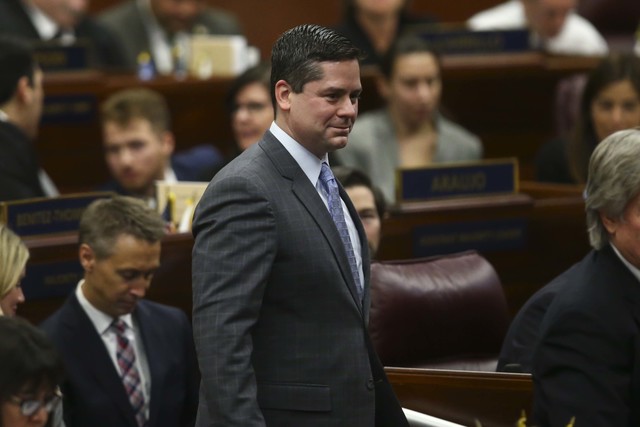What separation of powers? Politician wants to give himself a raise

CARSON CITY — It’d sure be nice to be able to vote yourself a pay raise. That’s what Assemblyman Steve Yeager, D-Las Vegas, wants to do with his recently introduced Assembly Bill 121.
The bill would allow public employees working for local governments to continue earning raises after collective bargaining agreements have expired. A reform passed in 2015 changed the law to prevent public employees from receiving step, merit or other pay increases after a collective bargaining agreement expired. This is important, because it gives unions a reason to negotiate. Otherwise, there are no consequences for the time-tested union strategy of making unreasonable demands because an unelected, unaccountable out-of-state arbitrator ultimately decides contracts . AB121 would apply raises retroactively.
AB121 is a terrible idea on its merits, but it gets worse. Outside of the Legislature, Yeager is a local government employee who would benefit from this bill.
Yeager’s actions highlight why the often-ignored separation of powers provision in Nevada’s constitution is so important. Article 3 says, “The powers of the Government of the State of Nevada shall be divided into three separate departments,—the Legislative,—the Executive and the Judicial; and no persons charged with the exercise of powers properly belonging to one of these departments shall exercise any functions, appertaining to either of the others…”
Because local governments are a creation of state government in Nevada’s constitution, local government employees are part of the executive branch. If executive or judicial branch employees are allowed to serve in the legislative branch, they serve two masters — and themselves twice over.
Unfortunately, the Nevada Supreme Court has made it extremely hard to uphold this vital part of our state constitution. The high court dismissed a lawsuit brought by the Nevada Policy Research Institute, my former employer, several years ago because Sen. Mo Denis, D-Las Vegas, quit his executive branch job the day he was served with NPRI’s lawsuit.
It isn’t just a Democrat problem. Several Republican lawmakers are also state or local government employees.
Yeager and other local government employees don’t need any more state-mandated advantages, either. Transparent Nevada shows that Yeager’s compensation increased from $112,892 in 2010 to $143,483 in 2015. Part of that increase comes from a promotion, but most is just the unsustainable compensation growth that local government employees now expect.
This is why county governments are so desperate to increase your property taxes. Those raises don’t pay for themselves.
Senate Minority Leader Michael Roberson, R-Henderson, was the sponsor of the 2015 bill that Yeager wants to roll back. Roberson’s bill passed unanimously in the Assembly and had only four nay votes in the Senate. Yeager is newly elected.
“I would urge Democrats not to follow the divisive lead of those who have said they will work to repeal Republicans’ historic reforms from the last session,” Roberson said in a statement. “And Democrats, once again, stop trying to raise people’s property taxes!”
Pay raises for government employees are pay cuts for you and me.
Victor Joecks’ column appears in the Nevada section each Monday, Wednesday and Friday. Contact him at vjoecks@reviewjournal.com. Follow @victorjoecks on Twitter.